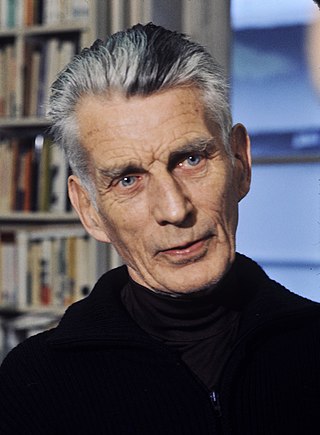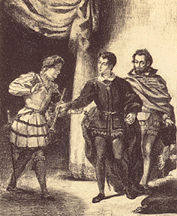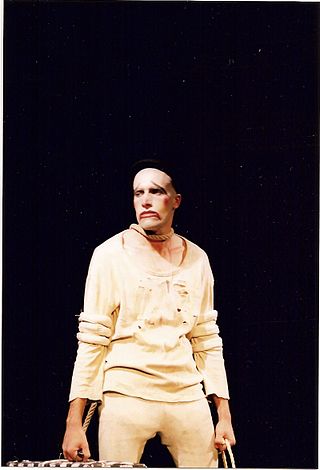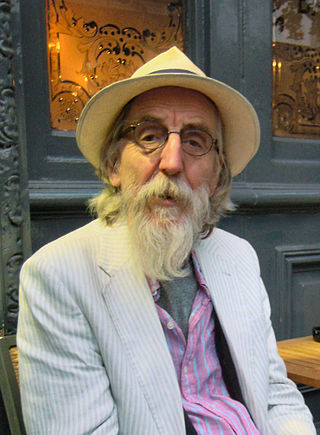
Samuel Barclay Beckett was an Irish novelist, dramatist, short story writer, theatre director, poet, and literary translator. His literary and theatrical work features bleak, impersonal, and tragicomic experiences of life, often coupled with black comedy and nonsense. His work became increasingly minimalist as his career progressed, involving more aesthetic and linguistic experimentation, with techniques of stream of consciousness repetition and self-reference. He is considered one of the last modernist writers, and one of the key figures in what Martin Esslin called the Theatre of the Absurd.

Waiting for Godot is a play by Irish playwright Samuel Beckett in which two characters, Vladimir (Didi) and Estragon (Gogo), engage in a variety of discussions and encounters while awaiting the titular Godot, who never arrives. Waiting for Godot is Beckett's reworking of his own original French-language play, En attendant Godot, and is subtitled "a tragicomedy in two acts". In a poll conducted by the British Royal National Theatre in 1998/99, it was voted as the "most significant English-language play of the 20th century".

The theatre of the absurd is a post–World War II designation for particular plays of absurdist fiction written by a number of primarily European playwrights in the late 1950s. It is also a term for the style of theatre the plays represent. The plays focus largely on ideas of existentialism and express what happens when human existence lacks meaning or purpose and communication breaks down. The structure of the plays is typically a round shape, with the finishing point the same as the starting point. Logical construction and argument give way to irrational and illogical speech and to the ultimate conclusion—silence.
Act Without Words I is a short play by Samuel Beckett. It is a mime, Beckett's first. Like many of Beckett's works, the play was originally written in French, being translated into English by Beckett himself. It was written in 1956 following a request from the dancer Deryk Mendel and first performed on 3 April 1957 at the Royal Court Theatre in London. On that occasion it followed a performance of Endgame. The original music to accompany the performance was written by composer John S. Beckett, Samuel's cousin, who would later collaborate with him on the radio play Words and Music.
Play is a one-act play by Samuel Beckett. It was written between 1962 and 1963 and first produced in German as Spiel on 14 June 1963 at the Ulmer Theatre in Ulm-Donau, Germany, directed by Deryk Mendel, with Nancy Illig (W1), Sigfrid Pfeiffer (W2) and Gerhard Winter (M). The first performance in English was on 7 April 1964 at the Old Vic in London. It was not well-received upon its British premiere.

Film is a 1965 short film written by Samuel Beckett, his only screenplay. It was commissioned by Barney Rosset of Grove Press. Writing began on 5 April 1963 with a first draft completed within four days. A second draft was produced by 22 May and a 40-leaf shooting script followed thereafter. It was filmed in New York City in July 1964. Beckett and Alan Schneider originally wanted Charlie Chaplin, Zero Mostel and Jack MacGowran; however, they eventually did not get involved. Beckett then suggested Buster Keaton. James Karen, who was to have a small part in the film, also supported having Keaton. The filmed version differs from Beckett's original script but with his approval since he was on set all the time, this being his only visit to the United States, as stated in the script printed in Collected Shorter Plays of Samuel Beckett.
Ohio Impromptu is a "playlet" by Samuel Beckett.

Krapp's Last Tape is a 1958 one-act play, in English, by Samuel Beckett. With a cast of one man, it was written for Northern Irish actor Patrick Magee and first titled "Magee monologue". It was inspired by Beckett's experience of listening to Magee reading extracts from Molloy and From an Abandoned Work on the BBC Third Programme in December 1957.
Vladimir is one of the two main characters from Samuel Beckett's Waiting for Godot.

Rosencrantz and Guildenstern are characters in William Shakespeare's tragedy Hamlet. They are childhood friends of Hamlet, summoned by King Claudius to distract the prince from his apparent madness and if possible to ascertain the cause of it. The characters were revived in W. S. Gilbert's satire, Rosencrantz and Guildenstern, and as the alienated heroes of Tom Stoppard's absurdist play, Rosencrantz and Guildenstern Are Dead, which was adapted into a film.
Pozzo is a character from Samuel Beckett's play Waiting for Godot. His name is Italian for "well".

Lucky is a character from Samuel Beckett's Waiting for Godot. He is a slave to the character Pozzo.
Act Without Words II is a short mime play by Samuel Beckett, his second. Like many of Beckett's works, the piece was originally composed in French, then translated into English by Beckett himself. Written in the late 1950s it opened at the Clarendon Press Institute in Oxford and was directed by John McGrath. London premiere was directed by Michael Horovitz and performed at the Institute of Contemporary Arts, on 25 January 1960. The first printing was in New Departures 1, Summer 1959.
Quad is a television play by Samuel Beckett, written and first produced and broadcast in 1981. It first appeared in print in 1984 where the work is described as "[a] piece for four players, light and percussion" and has also been called a "ballet for four people."

From An Abandoned Work, a "meditation for radio" by Samuel Beckett, was first broadcast on BBC Radio 3’s Third Programme on Saturday, 14 December 1957 together with a selection from the novel Molloy. Donald McWhinnie, who already had a great success with All That Fall, directed the Irish actor Patrick Magee.
Rough for Radio II is a radio play by Samuel Beckett. It was written in French in 1961 as Pochade radiophonique and published in Minuit 16, November 1975. Beckett translated the work into English shortly before its broadcast on BBC Radio 3 on 13 April 1976. Martin Esslin directed Harold Pinter, Billie Whitelaw (Stenographer) and Patrick Magee (Fox). The English-language version was first published in Ends and Odds as Radio II.
Ghost Trio is a television play, written in English by Samuel Beckett. It was written in 1975, taped in October 1976 and the first broadcast was on BBC2 on 17 April 1977 as part of The Lively Arts programme Beckett himself entitled Shades. Donald McWhinnie directed with Ronald Pickup and Billie Whitelaw. The play's original title was to be Tryst. "On Beckett’s notebook, the word was crossed out vigorously and the new title Ghost Trio written next to it. On the title page of the BBC script the same handwritten title change can be found, indicating that it must have been corrected at the very last minute."

Robert Goody was a British actor, librettist, writer and former member of the Royal Shakespeare Company.
While Waiting for Godot is a web series adaptation of Samuel Beckett’s play En Attendant Godot. It is the winner of Best Cinematography at the 2014 Rome Web Awards, and an Official Selection of the 2014 Miami Web Fest.
Minoru Betsuyaku was one of Japan's most prominent postwar playwrights, novelists, and essayists, associated with the Angura ("underground") theater movement in Japan. He won a name for himself as a writer in the "nonsense" genre and helped lay the foundations of the Japanese "theater of the absurd." His works focused on the aftermath of the war and especially the nuclear holocaust.








